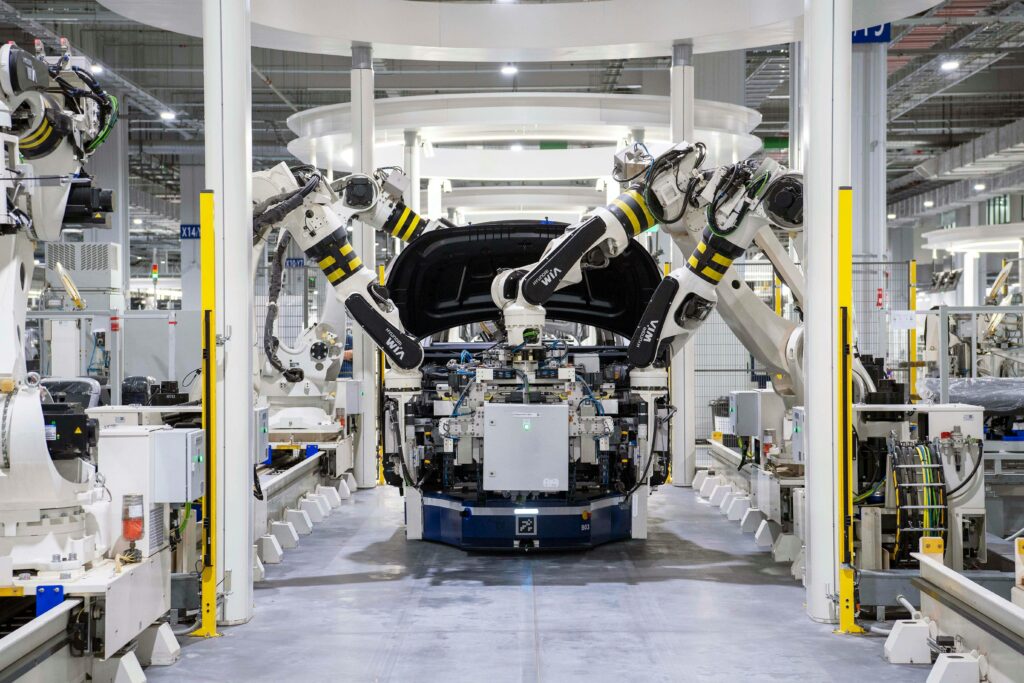
Explore the most recent advancements in manufacturing innovations, which are reshaping the industry and providing valuable insights into state-of-the-art technology. These innovations are changing how products are manufactured, leading to more efficient processes and increased productivity.
By delving into how these advancements enhance efficiency and quality in manufacturing, you can stay ahead of the competition. Discover the realm of manufacturing technology insights to uncover new opportunities for your business and drive its growth.
Table of Contents
- 1 Impact of Technology on Industry Innovations
- 2 Key Trends Driving Manufacturing Innovations
- 3 Emerging Trends: Revolutionizing Manufacturing
- 4 Manufacturing Technology Insights
- 5 Summary
- 6 Frequently Asked Questions
- 6.1 What are the key trends driving manufacturing innovation?
- 6.2 How is digital transformation impacting manufacturing processes?
- 6.3 Why are robotics and automation crucial for modern manufacturing?
- 6.4 What role do sustainable and green practices play in manufacturing?
- 6.5 How do additive technologies shape the future of manufacturing?
Impact of Technology on Industry Innovations
Digitalization and industry 4.0
Digitalization drives efficiency by automating processes, enhancing data analysis, and optimizing decision-making. Industry 4.0 technologies enable smart manufacturing through interconnected systems and real-time data exchange. Integrating IoT devices offers insights to streamline production, reduce downtime, and improve operational efficiency.
Robotics and automation
Robotic automation enhances production lines by performing repetitive tasks with precision and speed. Automated robotics streamline operations, increasing productivity while maintaining consistency in output quality. Implementing robotic systems improves accuracy, reduces errors, and ensures efficient resource utilization.
Additive manufacturing
Additive manufacturing, also known as 3D printing, revolutionizes traditional production methods by building objects layer by layer. This technology encompasses a range of processes, such as fused deposition modeling (FDM) and selective laser sintering (SLS). 3D printing finds applications in various industries, from aerospace to healthcare.
The advantages of 3D printing are evident in both the prototyping and production phases. Prototyping allows for rapid iteration and customization, saving time and money. For production, additive manufacturing enables complex geometries that traditional methods struggle with. This leads to lighter components and reduced material waste.
Looking ahead, the future of additive manufacturing is promising. Technological advancements will enhance speed, precision, and material options. Due to its efficiency and design flexibility, industries will increasingly adopt 3D printing for mass production. As sustainability gains importance in manufacturing innovations, additive technologies will be crucial in reducing carbon footprints.
Industrial internet of things (IIoT)
The Industrial Internet of Things (IIoT) enhances connectivity within manufacturing facilities, enabling seamless communication between machines, systems, and humans. IIoT devices monitor equipment remotely in real-time, providing valuable insights into performance metrics and maintenance requirements. Integrating IIoT solutions makes predictive maintenance more accurate, reducing downtime and optimizing operational efficiency.
Key Trends Driving Manufacturing Innovations
Sustainable practices
Implementing eco-friendly strategies in manufacturing innovations involves utilizing renewable energy sources, reducing waste generation, and optimizing resource usage. Companies are increasingly adopting sustainable practices to minimize environmental impact.
Reducing carbon footprint through sustainable practices entails implementing energy-efficient technologies, recycling materials, and optimizing transportation networks. These practices benefit the environment and improve manufacturers’ cost efficiency.
Promoting environmental responsibility in production processes includes adhering to strict environmental regulations, investing in green certifications, and engaging in community sustainability initiatives. These actions foster a positive brand image and enhance stakeholder relationships.
Reshoring strategies
Reshoring initiatives are rising as manufacturers bring production home to reduce dependence on overseas operations, manage supply chain vulnerabilities, and bolster local economies. This shift is fueled by the increasing need for faster response times and the escalating labor expenses in foreign countries.
Strengthening domestic production through reshoring efforts involves investing in local infrastructure, upskilling the workforce, and collaborating with government agencies to create favorable business environments. This boosts job creation and economic growth within the country.
Boosting local economies by reshoring manufacturing operations revitalizes communities, fosters manufacturing innovations, and ensures better quality control over products. Companies can respond more effectively to market demands by bringing production closer to consumers.
Advanced materials
Exploring cutting-edge materials for innovative products involves leveraging nanotechnology, biodegradable polymers, and composite materials to enhance product characteristics. These materials offer superior strength-to-weight ratios and improved functionality.
Enhancing product performance with advanced material selection enables manufacturers to create lighter, stronger, and more durable products. By incorporating materials like carbon fiber or graphene into their designs, companies can stay ahead of competitors regarding product quality.
Improving durability and functionality through advanced material research focuses on developing materials resistant to wear and tear, corrosion, or extreme conditions. By continuously innovating in this area, manufacturers can extend product lifecycles and reduce maintenance costs.
Digital twin innovation
Creating digital replicas for real-time monitoring and analysis allows manufacturers to track equipment performance, predict maintenance needs, and optimize production processes. This technology provides valuable insights for proactive decision-making.
Enhancing product design and development with digital twin technology enables virtual testing scenarios, rapid prototyping iterations, and seamless collaboration between design teams. This accelerates the time-to-market for new products while ensuring high-quality standards.
Improving operational efficiency through digital twin simulations involves virtually modeling entire production lines and facilities to identify bottlenecks, streamline workflows, and optimize resource allocation. By simulating various scenarios, manufacturers can fine-tune operations for maximum productivity.
Emerging Trends: Revolutionizing Manufacturing
Immersive technology applications
Immersive technologies reshape training programs by providing realistic simulations and interactive learning experiences. Companies are implementing virtual reality to enhance manufacturing processes, allowing employees to visualize complex procedures effectively. augmented reality applications are being utilized for improved design visualization, enabling engineers to collaborate seamlessly.
Big data and analytics
Manufacturers leverage big data to make informed decisions, optimize production processes, and streamline supply chains. By analyzing vast amounts of data, companies can identify patterns and trends to enhance efficiency and productivity significantly. Data-driven insights are crucial in driving continuous improvement and innovation within the manufacturing sector.
Cloud computing efficiency
Cloud computing transforms manufacturing by enhancing data storage, accessibility, collaboration, and scalability. Manufacturers are adopting cloud solutions to optimize resource utilization and improve operational flexibility. By migrating to cloud-based systems, companies can streamline operations, reduce costs, and enhance productivity in a highly competitive market.
5G network optimization
The integration of 5G networks is revolutionizing connectivity and communication in the manufacturing industry. Manufacturers leverage 5G technology to enable real-time data transfer for more efficient operations. The faster and more reliable data transmission facilitated by 5G networks empowers manufacturers to achieve higher levels of automation, precision, and responsiveness in their production processes.
Manufacturing Technology Insights
Automation advancements
Automation technologies continue to evolve, advancing manufacturing processes and boosting productivity. By integrating AI-driven automation, companies can achieve smarter manufacturing operations. These manufacturing innovations streamline tasks, leading to enhanced operational efficiency.
Key industry advancements include enhancing productivity by simplifying tasks, boosting automation efficiency, and minimizing manufacturing process errors.
Wearables for safety
Wearable technology is vital for maintaining worker safety in manufacturing settings. These gadgets track health data and environmental factors, improving the overall safety of the workplace. Companies can strengthen their safety measures by incorporating wearable technology effectively.
Major advancements in the manufacturing sector involve real-time monitoring of health and environmental conditions, using wearable devices to boost safety, and facilitating better communication among employees for faster responses.
Green manufacturing practices
Implementing green manufacturing practices is crucial for reducing energy consumption and waste in the industry. Companies are increasingly adopting eco-friendly initiatives to enhance sustainability in their production processes. By embracing these practices, manufacturers optimize operations and contribute to a healthier planet.
Manufacturing advancements now prioritize minimizing energy usage and waste and focus on fostering sustainability through environmentally friendly projects. Compliance with environmental regulations is essential to upholding ethical manufacturing standards
Summary
Staying competitive in the ever-changing manufacturing industry requires embracing new manufacturing innovations. By keeping up with the latest trends and advancements, businesses can improve operations, implement eco-friendly methods, and use state-of-the-art tools such as robotics, IoT, and additive manufacturing. These approaches boost productivity and contribute to a more sustainable future for the manufacturing sector.
As you navigate the dynamic realm of manufacturing innovations, remember that continuous learning and adaptation are key. Stay informed about emerging trends, explore new technologies, and prioritize sustainability in your operations. By proactively embracing change and innovation, you can position yourself as a leader in the industry and drive success in the ever-evolving manufacturing landscape.
Frequently Asked Questions
What are the key trends driving manufacturing innovation?
Manufacturing innovations is driven by technological advancements, digital transformation, robotics, automation, sustainable practices, additive technologies, and the integration of 5G and IoT technologies. These trends aim to enhance efficiency, productivity, sustainability, and competitiveness in the manufacturing industry.
How is digital transformation impacting manufacturing processes?
Digital transformation revolutionizes manufacturing by streamlining operations, improving data analytics for informed decision-making, enhancing supply chain management, enabling predictive maintenance, and facilitating agile production processes. This leads to increased efficiency, reduced costs, improved quality control, and faster product time-to-market.
Why are robotics and automation crucial for modern manufacturing?
Robotics and automation play a vital role in modern manufacturing by increasing productivity through consistent performance, reducing human error in repetitive tasks, enhancing worker safety in hazardous environments, optimizing production workflows for efficiency gains, and enabling flexible manufacturing capabilities to meet changing market demands.
What role do sustainable and green practices play in manufacturing?
Sustainable and green manufacturing practices focus on reducing environmental impact by minimizing waste generation, conserving energy resources, adopting eco-friendly materials and processes, and complying with regulations for sustainability standards. These manufacturing innovations benefit the environment, enhance brand reputation, and appeal to eco-conscious consumers.
How do additive technologies shape the future of manufacturing?
Additive technologies like 3D printing enable rapid prototyping, product customization, and complex geometries impossible with traditional methods. They reduce material waste during production processes while accelerating product development cycles. Additive technologies offer cost-effective solutions for small-batch products with design flexibility.
